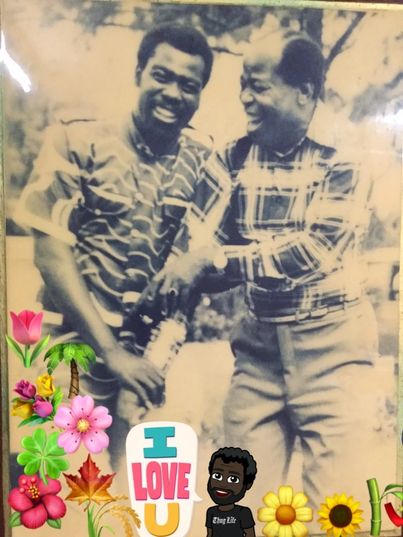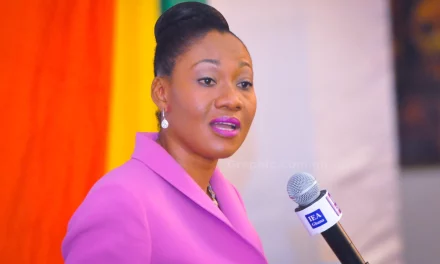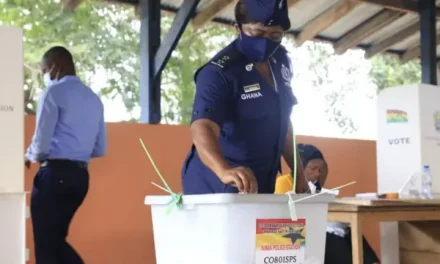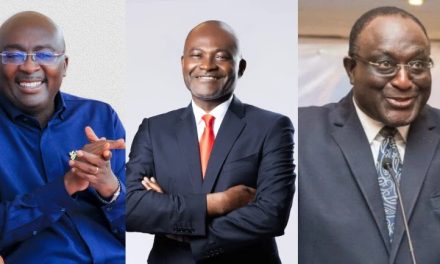
Kojo Sardine: The 62-Year-Old ‘Friend’ Of Rawlings Punished To Weed A 100-Acre Plantation17 min read

One of these people was a man named Benjamin Kojo Yemoh, popularly known as Kojo Sardine, described as someone whose family was friends with Rawlings before he seized power.
In a narration of what he knows about his grandfather, as well as others about his father, a grandson of Kojo Sardine described how Rawlings, supposedly threw away the friendship his family shared with him, and jailed his grandfather in an in humane manner.
This grandson also said that it was because his grandfather (Kojo Sardine) had wealth beyond normal Ghanaian standards, particularly during the period of hunger in the country, but quickly added that none of what he had was through illegal means.
“If I’m to believe the many stories, Rawlings was friendly with our family prior to seizing power. Which made the charges against grandpa seem deeply personal and envious. The official charges against B.K Yemoh were for tax evasion and importing yellow corn during the famine. He was beaten, thrown in jail and all his life’s work confiscated illegitimately by this rogue regime terrorizing everyone who they decided was richer than was reasonable by their estimation.
“Sure, my grandad was wealthier beyond normal Ghanaian standards but the source of his wealth was verifiable. That didn’t stop the dictator from brutalizing him, stripping him of all physical dignity, rendering his family homeless and destitute, him eventually dying at the Korle-Bu Teaching Hospital of complications from the turmoil of the treatment he had been dealt at the hands of this illegal and merciless regime.
“The record shows, that in a court of law, under a democratically transitioned PNDC to NDC government, Mr. Benjamin Kojo ‘Kojo Sardine’ Yemoh was found innocent of all the crimes he was accused of and killed for. The Commission on Human Rights and Administrative Justice – CHRAJ, found no basis for his arrest, imprisonment and confiscation of his entire estate.
“The courts awarded an unprejudiced victory to my family after a most daring and daunting challenge of this injustice while the NDC was still headed by Rawlings,” he said in a post shared by Ablade TV Online on Facebook, on Wednesday, October 27, 2021, with the headline, “Story of Kojo Sardine (B. K. Yemoh): A legacy of JJ Rawlings remembered; as narrated by a grandson.”
The narration also detailed how Jerry John Rawlings supposedly punished the industrialist (Kojo Sardine) to weed a 100-acre termite-infested sugarcane plantation.
This, he added, happened when his grandfather was 62-years-old.
Read the full account of this grandson of B. K. Yemoh (Kojo Sardine) below:
STORY OF KOJO SARDINE (B.K. YEMOH): A LEGACY OF JJ RAWLINGS REMEMBERED; AS NARRATED BY A GRANDSON
****The Legacy of Dictatorship****
My introduction to the words termites, acres and plantation was as early as 4years old. They were mentioned to me because according to the story, my grandpa, Benjamin Kojo Yemoh, a first generation industrialist had been punished by Rawlings to weed a 100-acre termite infested sugarcane plantation at age 62 as part of his punishment for being successful. Kojo Sardine, as he was most popularly known, has so many folktales around the origins of his moniker. He was no saint, but by any sensible account, he was an avid industrialist who was employing multitudes and was responsible for their livelihoods. This is not intended to be a deep dive into the man’s nickname or canonize him.The source of his wealth was no mystery. In fact, it was obviously verifiable in the monumental factories which currently stand as withering skeletons of their former vibrant productive operations. ICAP Pharmaceuticals – manufacturing world standard medicines. Labone Weavers Ltd – manufacturing textiles/fabrics. Labone Blocks & Tiles – supplying sand, stone and real estate construction. Woodwork Furniture Company – manufacturing furniture. An employer of over a 1,500 workers was suddenly detonated. For what?
When you’re young, you just believe and accept the information passed on by your parents and family elders as facts and law. As you get older and able to process the information and context of the history, you can be more assertive and deductive about facts vs sentiment. If I’m to believe the many stories, Rawlings was friendly with our family prior to seizing power. Which made the charges against grandpa seem deeply personal and envious. The official charges against B.K Yemoh were for tax evasion and importing yellow corn during the famine. He was beaten, thrown in jail and all his life’s work confiscated illegitimately by this rogue regime terrorizing everyone who they decided was richer than was reasonable by their estimation. Sure, my grandad was wealthier beyond normal Ghanaian standards but the source of his wealth was verifiable. That didn’t stop the dictator from brutalizing him, stripping him of all physical dignity, rendering his family homeless and destitute, him eventually dying at the Korle-Bu Teaching Hospital of complications from the turmoil of the treatment he had been dealt at the hands of this illegal and merciless regime. The record shows, that in a court of law, under a democratically transitioned PNDC to NDC government, Mr. Benjamin Kojo “Kojo Sardine” Yemoh was found innocent of all the crimes he was accused of and killed for. The Commission on Human Rights and Administrative Justice – CHRAJ, found no basis for his arrest, imprisonment and confiscation of his entire estate. The courts awarded an unprejudiced victory to my family after a most daring and daunting challenge of this injustice while the NDC was still headed by Rawlings. That in itself is an affirmation that, the wheels of justice cannot be denied those who steadfastly commit to due process and the rule of law in a civilized society not handicapped by fear of a strongman dictator. Make no mistake, attempts were made to foil this overturning of the PNDC rulings but turned out against all odds as one of the strongest repudiations against the military regime that took power and wielded it so brazenly against innocent citizens.
My introduction to the words oil paint, scars and military raid was because of the story of my father Shammy Davis “Big Boy” Yemoh being told to me by my grandma, my late grandpa’s widow, Mrs. Felicia Kwakye Yemoh who is still with us today even if the horror of Alzheimer’s ravages her. She told of a military raid at our home in Aboormi-La one early morning that had soldiers jamming the back of their rifles into my dad’s chest, dragging him out of the 5th floor apartment while my mother’s shrieking cries and screams deterred none of these heartless men in uniform. Apparently my siblings and I were weeping and confused at what was actually happening to our dad. It is said that they dipped his face in a gallon of white oil paint and shackled and detained him to some remote location in Teshie. This is why somehow, as a kid I naively and stupidly thought my dad’s white beard strands were the remnants of the white oil paint applied to his face by these soldiers. At Teshie he was at some point in line for firing squad, sentenced to die without trial. This is also how I learned about the phrase “big fish”. My father recounted being described as a “big fish” by the soldiers. Miraculously, one of the soldiers would come to his rescue and help him escape at the dark of dawn. His crime was resisting and refusing to cooperate with the regime in giving up the relevant documents to his father’s estate. These experiences rather emboldened the man to dedicate all of his prime as a man in a relentless pursuit of justice, not only to clear his late father’s name but, in his own principled way, echo the ideal that a people must have their day in court to redeem or defend themselves from any accusation brought up against them.
My grandpa and dad’s stories are not unique. They’re simply examples of a perverse use of power during this atrocious period of our national history. My sense of patriotism and kinship with Ghanaians are because of the memories and stories of my father and grandfather who managed to thrive in this beloved country against all odds. Patriots who loved this country like anyone you could put forth. I doubt Rawlings is more passionate about Ghana than my ancestors were until their dying days. My grandad was a patriot and loved his people, this Ghana. The evidence of his patriotism has its footprints all over Accra and beyond in the countless number of people who share their various stories of how he’d been extremely impactful and generous to their lives. My father was a patriot and loved Ghana unbelievably even after everything he’d lost and suffered at the hands of one of its governments. Even when it made sense to leave the country for a safer and more prosperous destination, he stayed put right here until his last breath. These are true stories. Real stories of the devastation and havoc one man’s unjustified sense of importance was able to do. There are generations of my family and the families of the Generals, Judges, Market women, Business owners and countless number of Ghanaians who are still traumatized and lives disrupted by the arbitrary actions of one man and his regimes’ estimation of who was responsible for Ghana’s economic challenges of the 70’s and early 80’s. The bloodshed remains a stain on the conscience of this country until we acknowledge the suffering. The murdering of those judges is one of the most harrowed acts in our entire history as it earthquaked the very core of order in a society. If Judges can be murdered so callously and no one ever held accountable, the very foundation of our democracy is broken. The regard for the rule of law, due process and citizens respecting the custodians of our judicial process must never be under threat. The legacy of this disregard may be reflected in the Muntiie 3 case — apples not falling too far from the tree?
The one man most responsible for the lasting damage to the psyche of the nation refused to ever acknowledge what his regime and reign had done to many Ghanaians. Not once did he express remorse or regret, a simple sorry or in retrospect, an “I would have approached things differently given the opportunity.” He was rather indignant and unapologetic. He took no responsibility for any of the atrocities carried out in the name of his regime. He rather negotiated into our constitution that he would never be liable or prosecutable for any of the actions of his AFRC & PNDC regimes. Now think about that! A man confident to bring arbitrary and extrajudicial justice upon those he estimated as guilty of whatever charges he manufactured was diligent enough or rather so terrified of his actions being examined by any inquiry to enshrine in our constitution that his actions were never to be probed under our democratic court systems. His mantra was probity and accountability for everyone else except him and his cronies. In light of the reasons he listed to demonize, torture, maim and kill people, everyone that served with Rawlings’ regimes are currently multi-millionaires living lavish lifestyles. The question must be asked, how did they acquire their wealth? Are they B.K Yemohs, Poku Transports, Boakye Matresses and countless other business owners and industry titans? Listing the names of political appointees and their personal financial advancement since wrangling power so bloodily would be petty but it begs asking, how did they muster the conscience to loot mother Ghana so brazenly after murdering scores of her citizens in the name of cleaning up corruption and kalabuley?
In 1979, army officers set bombs to the Accra market to disrupt the businesses of market women who were accused of ruining the economy because of the profits they were making on their goods. Our grandmothers and mothers were stripped naked in the streets, beaten, raped and chased out of town for what? The looting of Ghana’s resources by Rawlings, his wife and political cohorts is monumental. They”re notorious for forcefully or nefariously conniving to acquire state owned property as personal property and the proof is littered across the country. I point these things out for contrast, clarity and consideration by all those who have any integrity to examine. How did the movement of probity and accountability that had killed and destroyed so many businesses and families for the perceived crime of owning more than one toilet plunder with such gusto? How could they lavishly be flying public aircrafts to teach their kids how to pilot or travel to Europe shopping for curtains and living room accessories? How was this conscionable or possible for the usurper that executed Rear Admiral Joy Kobla Amedume for owning a car he bought on a bank loan, be rumored to have the most extensive collection of Jaguars?
The list of ailments caused by the cancerous reign of Rawlings’ regimes cannot be completely expoused by any articulation in speech or writing. It has never been fully accounted for or researched and that is a travesty and stain on the national conscience. The PTSD that survivors live with, some died with, the shifting of the national psyche towards success and those who work to earn what they have, all these psychological and social effects have never fully been assessed and addressed. Kudos to His excellency, J.A.K for at least trying with the National Reconciliation Commission. We do not seek retribution or compensation beyond what is owed but rather an acknowledgement by all our institutions that those brutalized, killed, had their businesses and lives destroyed is not justified collateral damage in the name of nation building. We did not sign up to be the sacrifices that so many comfortably reduce our trauma to. There is no “for the greater good” about Rawlings’ reign. He’s no martyr because he sacrificed nothing and yet gained everything material in his lifetime and enjoyed the proceeds of corruptly acquired national resources. The lesson of his legacy must be about teaching progeny the dangers of having a Messiah complex that lead to dictatorship, where justice and the rule of law is not defined by strong institutions but rather the whims of a collective of rogue vigilantes believing they alone have the solutions to our national challenges.
It is understandable for those not personally or directly affected by Rawlings’ regimes to be opposed to the kind of zero sum assessment of his impact on our society by those who were. His willingness allowed, however under duress and western institutional pressure they may have been, tthe transitioning of Ghana from military style authoritarian rule to our 4th republic. A military rule he had imposed nonetheless. Our economy was stagnant and underdeveloped but stable. There was some sense of general discipline in the country that is nostalgically overstated in retrospect but still relevant to the current climate of chaotic corruption we seem saddled with. We must understand how polarizing he is and it is fair to give some credence to the reality that, many Ghanaians find him charismatic, passionate and a pillar of patriotism whose impact on Ghana cannot be dismissed. A balanced view of his legacy must be taught from the perspective of reinforcing that, the atrocities and mayhem that came with it was NOT warranted. It must be established that, leadership must not be so deeply flawed in its excesses in order for a nation to progress. An example of the ineffectiveness of his legacy is shown in that one episode that he himself had to get out of his vehicle to direct traffic in February, 2019. On the surface and at its core, it was very much the J.J that won over many hearts with populist actions. However, the strength and lasting impact of any philosophy, ideology or school of thought is the ability to transcend any one man or leader. That is, it must live and thrive through our public institutions and the culture of society such that it can withstand the forces of chaos that seek to derail the ideals of civility. Leadership and civilization is messy and involves many complex challenges and conundrums. What we must aspire to as a basic standard is to never allow the concentration of power and opinion to be singularly controlled by one man or regime. The basic rights of everyone must be upheld regardless of the wrangling and agitation of stronger desires to achieve change or progress at any cost, however defined. May we never stop learning from all sides of this monumental legacy in our history.
I write this with no intention to disrespect the sanctity or sacredness of death but rather to remind us that, if one of us suffers an injustice meted out by our government, all of us must feel and share that injustice. That is what citizenship is or should be, a collective sharing of responsibility in being our brother’s keeper. The golden rule as stated; “do unto others how you’d like done unto you” is the most sacred of principles. If we cannot aspire to this ideal, then at least let’s acknowledge the sins we commit in the name of patriotism against one another. We must strive for a better republic, one that recognizes the rights of every citizen, not just that of those in power and their affiliates. We can be better and must be better. I am respectful of my own history and the story of my family but it was not necessary in order for those affected or Ghana for that matter to fulfill destiny. My uncles, aunties, siblings, cousins and extended family were robbed of the tutelage of one of the most industrious men in our national history in my grandpa and so were many of those who worked and could have worked for him. The country is worse off for his loss than it would ever be better off for it. That is not a singularly unique truth about my grandpa but for every life that was carelessly and callously disposed of by a self-righteous regime that inflicted soul-crushing wounds to generations.
That’s also true for all the other industrialists, business people, market women and citizens whose lives were upheaved by the AFRC/PNDC. I am hoping that at least, Rawlings’ descendants and the custodians of his legacy find the wisdom in taking a reconciliatory approach towards those who were irreparably marred and scarred by the actions of their patron by acknowledging the truth of his legacy and history.. That alone will be a huge step in some healing and contentment for some. May God keep blessing this beloved country of ours and keep showing us the path to civility and tolerance of each others differences rather than one that pits us against each other for expediency. No one man alone loves the country more than the rest of us and that should be a guiding light in our national discourse – economical, social or political. I wrote this piece in December and thought it appropriate decorum to give the moment it’s space to be to everyone what it is. In hearing the tributes of the children, the most striking irony of it was the profound sense of love they felt towards their father even to the oblivion of celebrating things he did for them that his regime murdered others fathers and mothers for. It’s not to pass judgment but rather hoping it serves as a point of inflection and reflection. I genuinely pray they find the right way to grieve and still love and honor their father while being able to properly appreciate what he’s impacted on our collective realities.



















